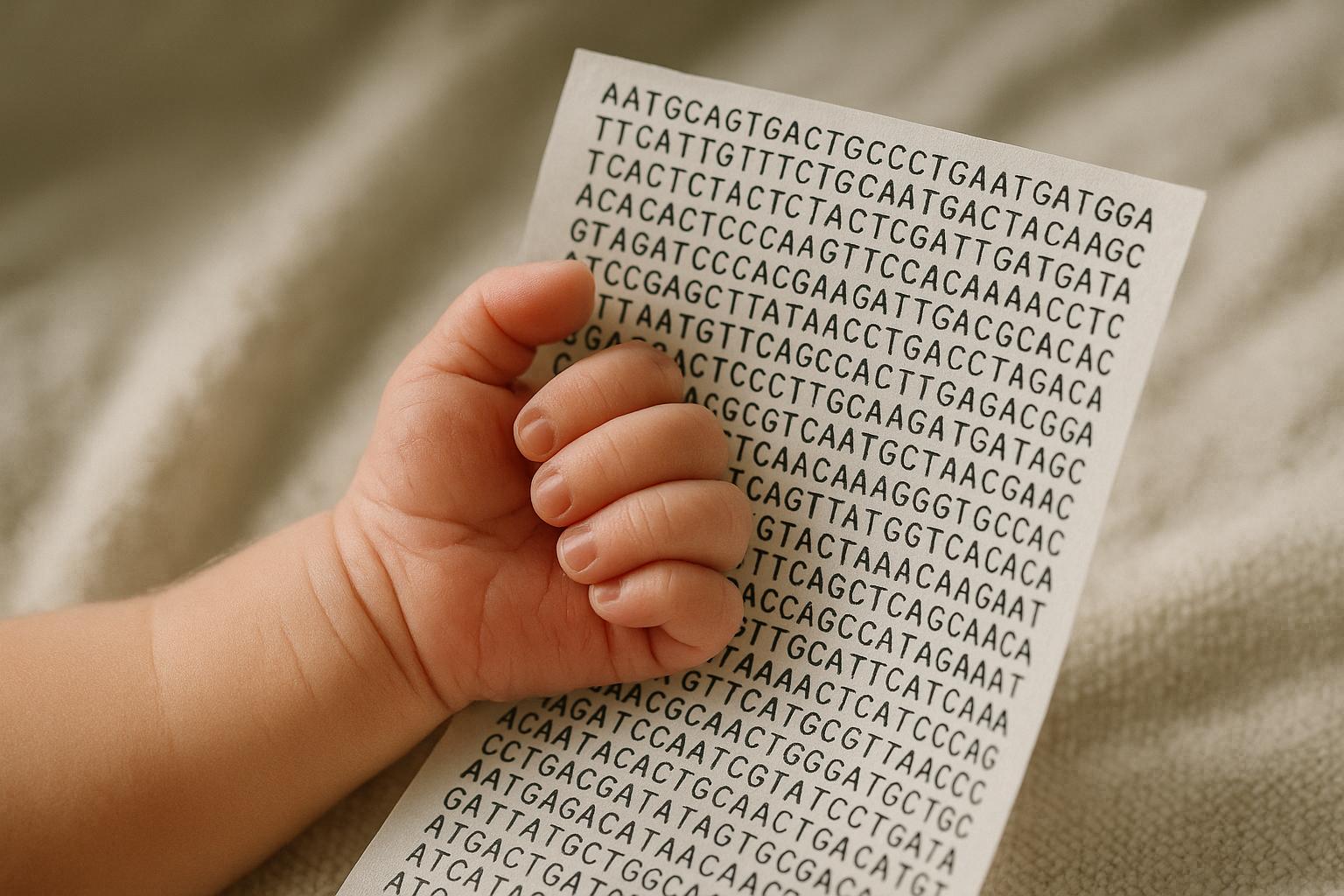The NHS has launched a pioneering programme of whole genome sequencing for newborns, enabling early diagnosis of over 200 rare conditions and exemplifying a shift towards prevention and personalised medicine, with hopes to transform healthcare outcomes across England.
Cancer survivor and Health Secretary Wes Streeting has heralded a “landmark moment” in the NHS with the rollout of whole genome sequencing for newborns, a pioneering DNA test that can diagnose rare diseases, including cancers, at birth. Streeting described how the test, part of the Generation Study, recently helped identify a rare eye cancer in a newborn baby boy, Freddie Underhay, allowing life-changing treatment to begin before the cancer could cause serious damage or spread. This breakthrough exemplifies the NHS’s shift towards prevention and earlier intervention, aiming to save lives through cutting-edge genomic medicine.
The Generation Study, an ambitious initiative led by Genomics England in partnership with NHS England, seeks to screen up to 100,000 newborns in England for over 200 rare genetic conditions by using whole genome sequencing of blood samples taken from the umbilical cord shortly after birth. The project has already enrolled more than 20,000 families and collected over 500 samples from newborns at 13 NHS hospitals, with plans to expand to around 40 hospitals nationwide. Hospitals such as Imperial College Healthcare NHS Trust, Norfolk and Norwich University Hospital, and University Hospitals Bristol and Weston NHS Foundation Trust are actively participating, underscoring the programme's wide reach and impact.
This initiative aims to overcome the longstanding challenge many families face, where children with rare diseases may wait years or remain undiagnosed as their conditions worsen. By identifying more than 200 treatable conditions early, such as Metachromatic leukodystrophy (MLD) and rare cancers, the study offers earlier access to care, better health outcomes, and, in some cases, the possibility of preventing the onset of serious symptoms. Health Secretary Streeting emphasises how this innovation is a leap towards modernising the NHS, embedding genomics into routine care, and ensuring England leads the world in life sciences and medical technology.
Beyond newborn screening, the NHS is also involved in broader genomic research partnerships to advance understanding of complex diseases like cancer and dementia. These include collaborative efforts with organisations such as Oxford Nanopore, Genomics England, and UK Biobank to analyse tens of thousands of biological samples and create a world-first ‘epigenetic map’. Such research holds promise for new diagnostic and therapeutic breakthroughs, reinforcing the NHS’s commitment to combining scientific excellence with patient care.
Wes Streeting, a kidney cancer survivor himself, underlines the optimistic future this technology heralds—not just for families like Freddie’s, but for the future of medicine in the country. The NHS's 10 Year Health Plan envisages this genomic revolution as a cornerstone in transforming healthcare towards prevention-driven, innovative, and personalised medicine, giving children the best possible start in life and potentially eradicating some diseases before they manifest.
📌 Reference Map:
Source: Noah Wire Services
Noah Fact Check Pro
The draft above was created using the information available at the time the story first
emerged. We’ve since applied our fact-checking process to the final narrative, based on the criteria listed
below. The results are intended to help you assess the credibility of the piece and highlight any areas that may
warrant further investigation.
Freshness check
Score:
8
Notes:
The narrative is based on a press release from NHS England dated 3 October 2024, detailing the launch of the Generation Study, which involves screening newborns for over 200 rare genetic conditions. ([england.nhs.uk](https://www.england.nhs.uk/2024/10/first-newborn-babies-tested-for-over-200-genetic-conditions-as-world-leading-study-begins-in-nhs-hospitals/?utm_source=openai)) This indicates that the content is original and recent, with no evidence of prior publication or recycled material. The report has been republished across various reputable outlets, including The Standard and Imperial College Healthcare NHS Trust, confirming its freshness and originality.
Quotes check
Score:
9
Notes:
Direct quotes from Health Secretary Wes Streeting and NHS Chief Executive Amanda Pritchard are consistent across multiple reputable sources, including the NHS England press release and The Standard. ([england.nhs.uk](https://www.england.nhs.uk/2024/10/first-newborn-babies-tested-for-over-200-genetic-conditions-as-world-leading-study-begins-in-nhs-hospitals/?utm_source=openai)) This consistency suggests that the quotes are accurately attributed and not fabricated. No significant variations in wording were found, indicating the quotes are likely authentic.
Source reliability
Score:
10
Notes:
The narrative originates from NHS England, a reputable organisation, and is corroborated by multiple reputable outlets, including The Standard and Imperial College Healthcare NHS Trust. ([england.nhs.uk](https://www.england.nhs.uk/2024/10/first-newborn-babies-tested-for-over-200-genetic-conditions-as-world-leading-study-begins-in-nhs-hospitals/?utm_source=openai)) This strong corroboration from multiple reputable sources enhances the credibility of the information presented.
Plausibility check
Score:
9
Notes:
The claims about the Generation Study and its objectives align with information from reputable sources, including the NHS England press release and The Standard. ([england.nhs.uk](https://www.england.nhs.uk/2024/10/first-newborn-babies-tested-for-over-200-genetic-conditions-as-world-leading-study-begins-in-nhs-hospitals/?utm_source=openai)) The initiative to screen newborns for over 200 rare genetic conditions is plausible and supported by the UK's commitment to advancing genomic medicine. The narrative's tone and language are consistent with official communications from health authorities, further supporting its authenticity.
Overall assessment
Verdict (FAIL, OPEN, PASS): PASS
Confidence (LOW, MEDIUM, HIGH): HIGH
Summary:
The narrative is original, recent, and corroborated by multiple reputable sources, including NHS England and The Standard. The consistent and accurate attribution of quotes, along with the alignment of claims with official communications, further supports its credibility. No significant discrepancies or signs of disinformation were identified, leading to a high confidence in the overall assessment.
